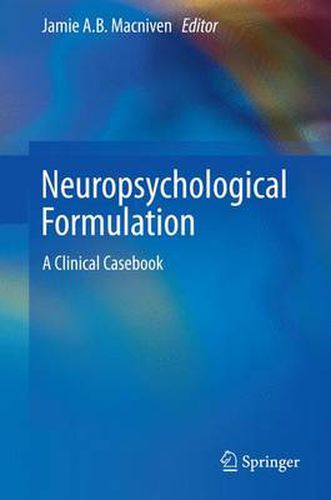Readings Newsletter
Become a Readings Member to make your shopping experience even easier.
Sign in or sign up for free!
You’re not far away from qualifying for FREE standard shipping within Australia
You’ve qualified for FREE standard shipping within Australia
The cart is loading…






This title is printed to order. This book may have been self-published. If so, we cannot guarantee the quality of the content. In the main most books will have gone through the editing process however some may not. We therefore suggest that you be aware of this before ordering this book. If in doubt check either the author or publisher’s details as we are unable to accept any returns unless they are faulty. Please contact us if you have any questions.
This forward-looking reference defines and illustrates the process and themes of formulation in neuropsychology and places it in the vanguard of current practice. The book explains the types of information that go into formulations, how they are gathered, and how they are synthesized into a clinically useful presentation describing psychological conditions resulting from neurological illness or injury. Cases highlight the relevance and flexibility of narrative- and diagram-based formulation methods in approaching a diverse range of issues and conditions, from decisional capacity to cultural considerations, Huntington’s disease to deep dyslexia. Throughout this volume, formulation is shown as integral to treatment and rehabilitation planning alongside clinical assessment, cognitive testing, and diagnosis.
Included among the topics:
The interface of neuroimaging with neuropsychological findings in traumatic brain injury.
Neuropsychological aspects of temporal-lobe epilepsy: seeking evidence-based practice. An integrative approach to differential diagnosis of subarachnoid hemorrhage and Korsakoff’s dementia.
Educational disengagement following mild TBI in childhood. Themes in the formulation of repeat assessments. Cognitive neuropsychological formulation.
Formulation is essential in good neuropsychological assessment as it provides the foundation for appropriate intervention by bringi
ng together the results of different evaluations into a coherent whole… . Macniven’s compelling and constructive book has assembled internationally known experts from diverse backgrounds to provide illumination of their own views and approaches to formulation, which makes the book a pleasure to read and should establish it as essential reading on clinical psychology and neuropsychology training courses. - Professor Barbara A. Wilson OBE, Ph.D.,
D.Sc. Neuropsychologists, clinical psychologists, and rehabilitation specialists will find Neuropsychological Formulation of critical importance not only to the literature of the field, but also to the developing role of clinical neuropsychology within healthcare systems.
$9.00 standard shipping within Australia
FREE standard shipping within Australia for orders over $100.00
Express & International shipping calculated at checkout
Stock availability can be subject to change without notice. We recommend calling the shop or contacting our online team to check availability of low stock items. Please see our Shopping Online page for more details.
This title is printed to order. This book may have been self-published. If so, we cannot guarantee the quality of the content. In the main most books will have gone through the editing process however some may not. We therefore suggest that you be aware of this before ordering this book. If in doubt check either the author or publisher’s details as we are unable to accept any returns unless they are faulty. Please contact us if you have any questions.
This forward-looking reference defines and illustrates the process and themes of formulation in neuropsychology and places it in the vanguard of current practice. The book explains the types of information that go into formulations, how they are gathered, and how they are synthesized into a clinically useful presentation describing psychological conditions resulting from neurological illness or injury. Cases highlight the relevance and flexibility of narrative- and diagram-based formulation methods in approaching a diverse range of issues and conditions, from decisional capacity to cultural considerations, Huntington’s disease to deep dyslexia. Throughout this volume, formulation is shown as integral to treatment and rehabilitation planning alongside clinical assessment, cognitive testing, and diagnosis.
Included among the topics:
The interface of neuroimaging with neuropsychological findings in traumatic brain injury.
Neuropsychological aspects of temporal-lobe epilepsy: seeking evidence-based practice. An integrative approach to differential diagnosis of subarachnoid hemorrhage and Korsakoff’s dementia.
Educational disengagement following mild TBI in childhood. Themes in the formulation of repeat assessments. Cognitive neuropsychological formulation.
Formulation is essential in good neuropsychological assessment as it provides the foundation for appropriate intervention by bringi
ng together the results of different evaluations into a coherent whole… . Macniven’s compelling and constructive book has assembled internationally known experts from diverse backgrounds to provide illumination of their own views and approaches to formulation, which makes the book a pleasure to read and should establish it as essential reading on clinical psychology and neuropsychology training courses. - Professor Barbara A. Wilson OBE, Ph.D.,
D.Sc. Neuropsychologists, clinical psychologists, and rehabilitation specialists will find Neuropsychological Formulation of critical importance not only to the literature of the field, but also to the developing role of clinical neuropsychology within healthcare systems.